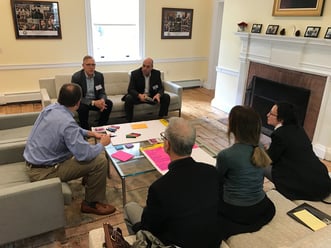I recently had the opportunity to represent Array on Philadelphia University’s College of Architecture and the Built Environment Advancement Council. The Council comprises industry members from a variety of markets and roles. We are asked twice a year to participate in a half-day workshop to provide direction to the academic leaders as they develop new programs. On Friday, April 21st, Professor Rob Flemming presented an emerging idea around non-traditional graduate education. It included combining continuing education with nano-degrees, micro-credentials, and stackable degrees. After the presentation, we were split into small groups and charged with developing a 12-credit certificate program for an area in which we felt the industry is lacking, which could be combined over time by interested students with other certificates to earn a master’s degree.


I was in a group with the Director of Philadelphia University’s Interior Design program, two architects and a communications and PR consultant in the architecture/engineering/construction industry. We developed a certificate program in Practice Leadership. We broke the content into three main categories: winning work, doing work, and completing work, and then identified four horizontal value streams that could each be a micro-credential program (Leadership, Communication, Risk Management and People). If a student completed all four micro-credentials, they would earn the full certificate or nano-degree. If they then completed two other certificates from the college, they would qualify for a master’s degree.
It was a really interesting way to think about focused education for professionals who may not be seeking, or able to commit to, a full master’s degree, but want to gain specialized training in specific areas. The nano-credential acknowledges professionals’ additional training and could be combined with licensure continuing education to incent participation by individuals and firms.
The other three groups created the following certificate programs: Integrated Project Delivery, Emerging Professional Leadership, and Sustainability. What I find most compelling about the concept behind allowing each student the opportunity to craft a graduate program around their interests is how this could develop into truly multi-disciplinary education, connecting industry partners with traditional university programs.
Philadelphia University has forged a unique relationship with Thomas Jefferson University, which includes the Sidney Kimmel Medical School. As a healthcare architect and advisor, I see the nano-degree program opening doors for students to really delve into their particular passions—such as healthcare design or geospatial planning—and upon certification completion, be so much more prepared to contribute to their chosen industry.


